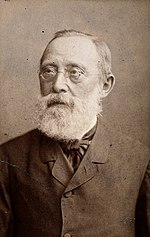Rudolf Virchow, Date of Birth, Place of Birth, Date of Death
TweetRudolf Virchow
German doctor, anthropologist, public health activist, pathologist, prehistorian, biologist and politician
 Date of Birth: 13-Oct-1821
Date of Birth: 13-Oct-1821
 Place of Birth: Świdwin, West Pomeranian Voivodeship, Poland
Place of Birth: Świdwin, West Pomeranian Voivodeship, Poland
Date of Death: 05-Sep-1902
Profession: physician, politician, biologist, university teacher, paleontologist, pathologist, academic, archaeologist, anthropologist, prehistorian, paleoanthropologist
Zodiac Sign: Libra 
About Rudolf Virchow
- Rudolf Ludwig Carl Virchow (; German: ['f??ço] or ['v??ço]; 13 October 1821 – 5 September 1902) was a German physician, anthropologist, pathologist, prehistorian, biologist, writer, editor, and politician.
- He is known as "the father of modern pathology" and as the founder of social medicine, and to his colleagues, the "Pope of medicine".
- He received the Copley Medal in 1892.
- He was a foreign member of the Royal Swedish Academy of Sciences and was elected to the Prussian Academy of Sciences, but he declined to be ennobled as "von Virchow". Virchow studied medicine at the Friedrich-Wilhelms Institute under Johannes Peter Müller.
- He worked at the Charité hospital under Robert Froriep, whom he succeeded as the prosector.
- His investigation of the 1847–1848 typhus epidemic in Upper Silesia laid the foundation for public health in Germany, and paved his political and social careers.
- From it, he coined a well known aphorism: "Medicine is a social science, and politics is nothing else but medicine on a large scale".
- He participated in the Revolution of 1848, which led to his expulsion from Charité the next year.
- He then published a newspaper Die Medizinische Reform (The Medical Reform).
- He took the first Chair of Pathological Anatomy at the University of Würzburg in 1849.
- After five years, Charité reinstated him to its new Institute for Pathology.
- He co-founded the political party Deutsche Fortschrittspartei, and was elected to the Prussian House of Representatives and won a seat in the Reichstag.
- His opposition to Otto von Bismarck's financial policy resulted in an anecdotal "Sausage Duel", although he supported Bismarck in his anti-Catholic campaigns, which he named Kulturkampf ("culture struggle").A prolific writer, his scientific writings alone exceeded 2,000.
- Cellular Pathology (1858), regarded as the root of modern pathology, introduced the third dictum in cell theory: Omnis cellula e cellula ("All cells come from cells").
- He was a co-founder of Physikalisch-Medizinische Gesellschaft in 1849 and Deutsche Gesellschaft für Pathologie in 1897.
- He founded journals such as Archiv für Pathologische Anatomie und Physiologie und für Klinische Medizin (with Benno Reinhardt in 1847, from 1903 under the title Virchows Archiv), and Zeitschrift für Ethnologie (Journal of Ethnology).
- The latter is published by German Anthropological Association and the Berlin Society for Anthropology, Ethnology and Prehistory, the societies which he also founded.Virchow was the first to describe and christen diseases such as leukemia, chordoma, ochronosis, embolism, and thrombosis.
- He coined biological terms such as "chromatin", "neuroglia", "agenesis", "parenchyma", "osteoid", "amyloid degeneration", and "spina bifida"; terms such as Virchow's node, Virchow–Robin spaces, Virchow–Seckel syndrome, and Virchow's triad are named after him.
- His description of the life cycle of a roundworm Trichinella spiralis influenced the practice of meat inspection.
- He developed the first systematic method of autopsy, and introduced hair analysis in forensic investigation.
- He was critical of what he described as "Nordic mysticism" regarding the Aryan race.
- As an anti-evolutionist, he called Charles Darwin an "ignoramus" and his own student Ernst Haeckel a "fool".
- He described the original specimen of Neanderthal man as nothing but that of a deformed human.
Read more at Wikipedia
See Also
- Famous People's Birthdays on 13 October, Poland
- Famous People's Birthdays in October, Poland
- Famous physician's Birthdays on 13 October, Poland
- Famous physician's Birthdays in October, Poland
- Famous politician's Birthdays on 13 October, Poland
- Famous politician's Birthdays in October, Poland
- Famous biologist's Birthdays on 13 October, Poland
- Famous biologist's Birthdays in October, Poland
- Famous university teacher's Birthdays on 13 October, Poland
- Famous university teacher's Birthdays in October, Poland
- Famous paleontologist's Birthdays on 13 October, Poland
- Famous paleontologist's Birthdays in October, Poland
- Famous pathologist's Birthdays on 13 October, Poland
- Famous pathologist's Birthdays in October, Poland
- Famous academic's Birthdays on 13 October, Poland
- Famous academic's Birthdays in October, Poland
- Famous archaeologist's Birthdays on 13 October, Poland
- Famous archaeologist's Birthdays in October, Poland

